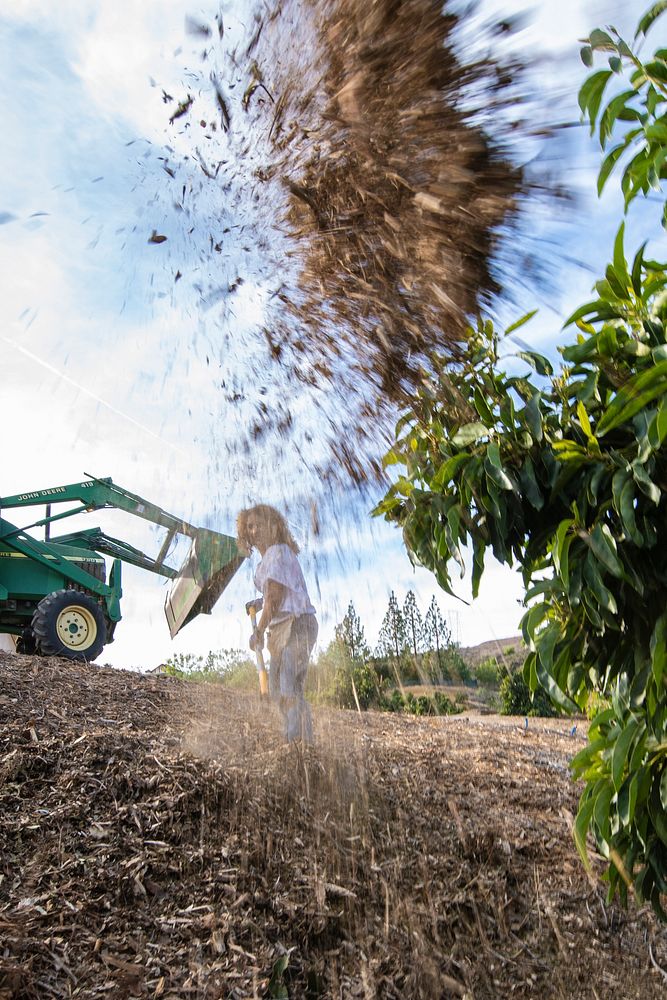
Martha Romero guides husband Salvador Prieto as he drives and dumps a load of mulch at their Hass avocado trees; she’ll then toss the mulch into place near the tree trunks and under the canopy, in Somis, CA, on Nov 15, 2018.
All the while, they ensure the micro irrigation sprinklers are not damaged.
Salvador Prieto grew up watching and helping his father grow corn and beans on a small farm in Mexico. The journey from bean fields to 20-acre orchard owner with his wife Martha Romero was not a straight and narrow path to Somis, Calif. In fact, it was music that brought him to the United States. Today the passion is agriculture.
Similarly, Romero didn’t follow a career in agriculture to her beautiful and healthy avocado and lemon orchard. Romero grew up a city girl in the heart of Los Angeles. Now sharing this farm with her husband and two children, she quickly credits her success to the support and assistance from her family to navigate the learning curve.
Constantly seeking improvement on the family’s orchard, Romero discovered the local Farm Bureau and the Ventura County Agricultural Irrigated Land Group (VCAILG) coalition. VCAILG put Romero in touch with the USDA Natural Resources Conservation Service (NRCS) and the Ventura Resource Conservation District, for technical and financial assistance to implement conservation and management practices.
NRCS California District Conservationist Dawn Afman, Soil Conservationist Elizabeth Keith, and Resource Conservationist Brooks Engelhardt, have all provided technical assistance and invested their time and expertise in helping Prieto and Romero incorporate conservation practices in their orchard. Prieto and Romero were immediately intrigued by NRCS’s efforts to improve soil health.
“At first it was overwhelming, but many other farmers I know are members, so it is comforting to know that I am not alone,” said Romero. “We need to make a profit, obviously, but, for me, I want to do it while protecting mother nature and precious resources like water. I am able to do this with NRCS’s help.”
Prieto and Romero learned a lot from trial and error. Romero admits that she even bought her trees before the land was ready. But learning opportunities, like an early community garden project, gave them critical knowledge and experience.
A big first conservation practice they learned was mulching to save water and reduce weeds. NRCS helped Prieto and Romero with this, through an Environmental Quality Incentives Program (EQIP) contract, to apply mulch to their orchard floor to conserve soil moisture and improve soil health in the Fall of 2018.
“Every time we have a question or need assistance, NRCS has been nothing but helpful,” added Romero. “They let us know about other programs out in the community and invited us to their annual Latino Farmer Conference, where my husband and I learned about other helpful resources.”
Recently, Prieto and Romero entered into a new NRCS contract to implement Irrigation Water Management (IWM) to their orchard. The IWM plan includes installing moisture sensors into the ground, which transmit continuous data to cloud-based storage, and accessed through a smart device app on their phones. The information lets them know when, where and how long to irrigate. This knowledge will help them toward their goal of producing 6,000 pounds of produce per acre.
Looking toward the future, Romero expressed that knowledge is key. “Before we plant further, we need to get educated on how to do it best,” concluded Romero. “From the planting of a seed or planting of a tree, we need the entire process to be profitable. It's not just about planting it. It's about preparing the land and using the resources wisely.”
In the meantime, Romero enjoys the weekends because she does not need to be worried about picking up the kids from school or rushing around. She just wants to be out in the orchard, making it better From mulching to pruning or irrigating and weeding. The family’s goal is to make the farm “better tomorrow than it was today.”
Farm Production and Conservation (FPAC) is the Department’s focal point for the nation’s farmers and ranchers and other stewards of private agricultural lands and non-industrial private forest lands. FPAC agencies implement programs designed to mitigate the significant risks of farming through crop insurance services, conservation programs, and technical assistance, and commodity, lending, and disaster programs.
The agencies and services supporting FPAC are Farm Service Agency (FSA), Natural Resources Conservation Service (NRCS), and Risk Management Agency (RMA).
NRCS has a proud history of supporting America’s farmers, ranchers, and forest landowners for more than 80 years. USDA helps people make investments in their operations and local communities to keep working lands working, boost rural economies, increase the competitiveness of American agriculture, and improve the quality of our air, water, soil, and habitat.
From weather to pests, and from a lack of time to markets, each American farmer faces a unique set of challenges. The Environmental Quality Incentives Program (EQIP) helps agricultural producers confront those challenges – all while conserving natural resources like soil, water, and air.
This voluntary conservation program helps producers make conservation work for them. Together, NRCS and producers invest in solutions that conserve natural resources for the future while also improving agricultural operations.
Through EQIP, NRCS provides agricultural producers with financial resources and one-on-one help to plan and implement improvements, or what NRCS calls conservation practices. Using these practices can lead to cleaner water and air, healthier soil and better wildlife habitat, all while improving agricultural operations. Through EQIP, you can voluntarily implement conservation practices and NRCS co-invests in these practices with you.
USDA Photo by Lance Cheung. Original public domain image from Flickr